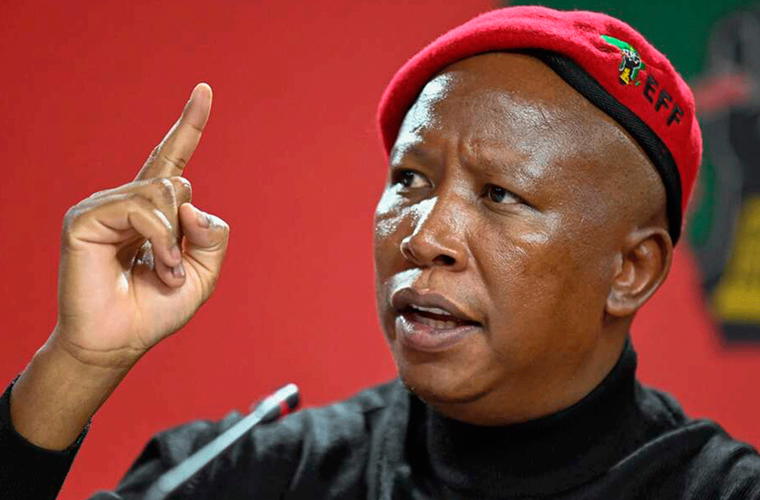Malema condemns xenophobia, calls for economic collaboration between Nigeria, South Africa

By Chinedu Adonu
Fiery South African opposition leader and President of the Economic Freedom Fighters (EFF), Hon. Julius Malema, has condemned xenophobia often carried out in South Africa, saying it is a betrayal of African unity.
Malema also called for deeper economic collaboration between Nigeria and South Africa, declaring that the future of Africa’s prosperity depends on the unity and industrialization of its two biggest economies.
Malema, who spoke in Enugu as the guest speaker at the 2025 Annual Conference of the Nigeria Bar Association, NBA, said Africans should not allow anyone to divide them with xenophobia, insisting that Africa is one.
He warned African nations against taking loans from the World Bank, the International Monetary Fund (IMF), and other institutions, describing it as a “debt trap” that could jeopardize the continent’s future.
The EFF leader also reiterated his party’s radical vision of a borderless Africa with a single currency, a unified parliament, and a single military command. He urged Africans to reclaim their land, resources, and destiny from imperialist control.
Delivering the keynote address at the 2025 Nigerian Bar Association (NBA) Annual General Conference in Enugu, theme: “Stand out, Stand tall”, Malema paid glowing tribute to Nigeria’s historic role in South Africa’s liberation struggle, while challenging African nations to break free from the shackles of colonial economic dependency.
“Nigeria is not just another African country to us. It is a comrade nation that stood firmly by our side during our darkest hour when South Africa was shackled by apartheid. Nigerians sacrificed their salaries, students paid the Mandela tax, and successive governments took bold stands, including boycotting the 1976 Olympics and 1979 Commonwealth Games. We cannot forget those who stood with us when it mattered most.
“The debt trap of Africa to our foreign colonisers must be stopped, and that begins by regulating these loans that our leaders commit future generations to, because they will not be there when the colonisers come to collect,” Malema stated.
He recalled that shortly after his release from prison in 1990, Nelson Mandela made one of his first international visits to Lagos and Abuja to personally thank the Nigerian people. According to Malema, that bond of solidarity, forged in sacrifice, must not remain a relic of history but should be transformed into concrete economic collaboration today.
Malema lamented that despite their enormous resources, both Nigeria and South Africa remain trapped in colonial economic arrangements where raw materials are exported cheaply to Europe, America and Asia, only to be sold back to Africans at “crazy prices” as finished goods.
“The path forward is clear: Nigeria and South Africa must industrialise together, build factories together and process our resources on African soil. Imagine a joint programme where South African mining expertise is combined with Nigerian oil wealth to create African-owned energy and resource conglomerates. Imagine Nigeria feeding the continent while South African technology drives logistics and machinery. That is the Africa we must build.”
He pointed to existing economic linkages, with South African companies such as MTN, Shoprite, and Multichoice already thriving in Nigeria, while Nigerian music, film, and literature have had a profound influence on South African culture. But he warned that these gains are often overshadowed by the scourge of xenophobia.
Malema condemned xenophobic attacks in South Africa as a betrayal of African unity, describing them as “a sickness born of poverty, inequality and government failure.
“Let me be unequivocal: xenophobia is anti-African unity, we must educate our people that unity, not division, is the solution to the African crisis. A Nigerian in Johannesburg or a Ghanaian in Cape Town is not a foreigner but an African contributing to Africa’s progress. In the same way, South African entrepreneurs must be welcomed in Lagos as partners in a shared future.”
He called for freer movement across the continent, including visa-free travel between Nigeria and South Africa, harmonized trade policies, and continental infrastructure that binds African economies into one integrated market.
Malema also placed Nigeria and South Africa’s partnership within a broader Pan-African and global context. He reiterated the EFF’s solidarity with oppressed peoples worldwide, including those in Western Sahara, Palestine, Cuba, Haiti, and the Democratic Republic of the Congo.
“The struggle of South Africa against apartheid taught us that the suffering of one oppressed people is the suffering of all oppressed people everywhere.
“Our liberation as Africans will remain incomplete if we turn a blind eye to the struggles of those who continue to suffer under occupation, colonialism, imperialism and economic exploitation.”
He criticised what he called the hypocrisy of international justice, which moves swiftly against leaders in the Global South but drags its feet when crimes are committed by Western powers or their allies. Citing South Africa’s case at the International Court of Justice, accusing Israel of genocide in Gaza, he insisted that Africa must build its own legal institutions to guarantee justice.
“If the so-called international community is unwilling to deliver justice in real time, then Africa must advance its own courts, its own tribunals, its own instruments of solidarity,” Malema declared.
The EFF leader, therefore, restated his party’s radical vision of a borderless Africa with one currency, one parliament, and one military command. He urged Africans to reclaim their land, resources, and destiny from imperialist control.
“We are not a dark continent. How can we be dark when we have diamonds that shine among us?” he asked, drawing loud applause from the lawyers and dignitaries at the conference.
“Together, Nigeria and South Africa can lead Africa into a future where we are not beggars but giants, not divided tribes but one people. Our salvation will not come from Washington or Brussels, it lies here, in Lagos and Johannesburg, in Abuja and Pretoria, in the hands of Africans who refuse to be divided.”
The post Malema condemns xenophobia, calls for economic collaboration between Nigeria, South Africa appeared first on Vanguard News.







